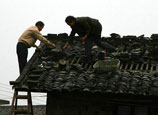
Since 2007, Jiang has been renting land from the 40 families in his village for about 47 yuan a hectare. He receives about 41 yuan a hectare as a subsidy from the government as an encouragement to support family farms.
"So the cost of the land is almost covered by the government," he said.
Jiang bought an apartment in the central area of Songjiang district last year for 300,000 yuan.
Xu said when they started the pilot scheme few were willing to give it a try, largely because of concerns about the relatively big input for farming land of more than seven hectares and the stability of the government's subsidy policy.
"But too many people are applying to join the program these days and we have to create a higher threshold to select qualified family farm operators," she said, adding that young or middle-aged people with a rural home and agricultural skills are preferred.
"Under decent market conditions, the restriction on a farmer's income mostly depends on the scale of agricultural production. In other words, the manpower in a family fails to reach a farm's full potential. Enlarging the farmers' agricultural scale would put more people to work and could therefore steadily improve rural people's living conditions," said Dang Guoying, a senior researcher with the Institute of Rural Development under the Chinese Academy of Social Sciences.
A rough calculation suggests China has to reduce its number of agricultural households to 30 million to ensure rural residents' income is on a par with that of urban citizens, taking into account the continuous rise of the average urban income, he added.
Sun Hongrong said he hopes the government will extend the contract for land transfers.
"A 10-year contract would be ideal," he said. Sun is considering becoming an organic farmer but the higher added-value requires a larger personal input.
He said it is vital to regulate family farm operators' activities, including preventing the soil from being exhausted of its nutrients and keeping it free from pollution caused by the disposal of plastics or excessive use of fertilizer.
China's grain output rose 3.2 percent year-on-year to hit a record high of 590 million tons in 2012, marking the ninth consecutive year of growth.
However, official customs figures show that the country's grain imports also hit a record high of 72.3 million tons last year, which is evidence of a strained balance between domestic grain supply and demand.

















 Now you can use mobile phone to 'call' the dead
Now you can use mobile phone to 'call' the dead


![]()
